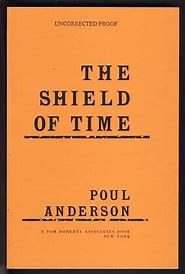If Antiochus had gained complete control of Asia Minor, then one of his descendants might have succeeded in crushing Judaism in Palestine, thus preventing Christianity and making the Danellian timeline:
"'...a phantom, a might-have-been, which, conceivably, an alternate Time Patrol keeps suppressed.'"
-Poul Anderson, The Shield Of Time (New York, 1991), PART TWO, 1987 A. D., p. 76.
(However, it turns out that such success for Antiochus was very improbable.)
If the Exaltationists had made themselves overlords throughout the world, then:
"'There'd never have been a you or a me, a United States, a Danellian destiny, a Time Patrol...unless they organized one of their own to protect the misshapen history they brought into being.'"
-Poul Anderson, "The Year of the Ransom" IN Anderson, Time Patrol (Riverdale, NY, 2010), pp. 641-735 AT 23 May 1987, p. 718.
The Time Patrol series could be developed in different directions:
further episodes set in yet more historical periods;
wars between rival Patrols!
Here is a third possibility:
"'Time travel was old when [the Danellians] emerged, there had been uncountable opportunities for the foolish and the greedy and the mad to turn history inside out.'"
--Poul Anderson, "Time Patrol" IN Anderson, Time Patrol, pp. 1-53 AT 2, p. 11.
Stories set in that long period of extratemporal interventions unregulated by a Patrol.
Is anyone who wants to change anything foolish, greedy or mad? No. In "Time Patrol," Stane is a well-intentioned time criminal.










































